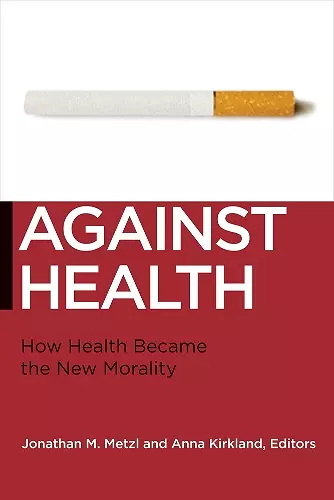Against Health
How Health Became the New Morality
Jonathan M Metzl editor Anna Kirkland editor
Format:Hardback
Publisher:New York University Press
Published:23rd Nov '10
Currently unavailable, and unfortunately no date known when it will be back
This hardback is available in another edition too:
- Paperback£21.99(9780814795934)

Navigates the divergent cultural meanings of health, and its entanglement with morality in current political discourse
You see someone smoking a cigarette and say,“Smoking is bad for your health,” when what you mean is, “You are a bad person because you smoke.” You encounter someone whose body size you deem excessive, and say, “Obesity is bad for your health,” when what you mean is, “You are lazy, unsightly, or weak of will.” You see a woman bottle-feeding an infant and say,“Breastfeeding is better for that child’s health,” when what you mean is that the woman must be a bad parent. You see the smokers, the overeaters, the bottle-feeders, and affirm your own health in the process. In these and countless other instances, the perception of your own health depends in part on your value judgments about others, and appealing to health allows for a set of moral assumptions to fly stealthily under the radar.
Against Health argues that health is a concept, a norm, and a set of bodily practices whose ideological work is often rendered invisible by the assumption that it is a monolithic, universal good. And, that disparities in the incidence and prevalence of disease are closely linked to disparities in income and social support. To be clear, the book's stand against health is not a stand against the authenticity of people's attempts to ward off suffering. Against Health instead claims that individual strivings for health are, in some instances, rendered more difficult by the ways in which health is culturally configured and socially sustained.
The book intervenes into current political debates about health in two ways. First, Against Health compellingly unpacks the divergent cultural meanings of health and explores the ideologies involved in its construction. Second, the authors present strategies for moving forward. They ask, what new possibilities and alliances arise? What new forms of activism or coalition can we create? What are our prospects for well-being? In short, what have we got if we ain't got health? Against Health ultimately argues that the conversations doctors, patients, politicians, activists, consumers, and policymakers have about health are enriched by recognizing that, when talking about health, they are not all talking about the same thing. And, that articulating the disparate valences...
[T]his collection of essays reexamines the definition of & health, particularly as a mechanism for moral judgment... Lots of food for thought- this highly philosophical book... will be of interest to those wanting to stretch their views on health care. * Library Journal *
These essays are well-researched and supported, and this volume is suitable for academic studyin sociology, bioethics public health and public policy. It is also remarkably well written and engaging, and makes its sophisticated theoretical premises readily accessible to a wide audience. -- Lisa Bellatoni * Metapsychology Reviews *
This book provides a strong antidote to the common notion that health is an unqualified good and often an individual responsibility. -- Peter Conrad * Sociology of Health & Illness *
From obesity to mental health to pharmacology, the essays explore the ways in which "public" health translates increasingly as a moral judgement of behavior. * Society Magazine *
A powerful group of essays, and the topics addressed in the respective chapters are interesting, insightful, and thought-provoking. -- David Serlin,author of Replaceable You: Engineering the Body in Postwar America
[A]n important new book. * Psychology Today *
ISBN: 9780814795927
Dimensions: unknown
Weight: unknown
226 pages